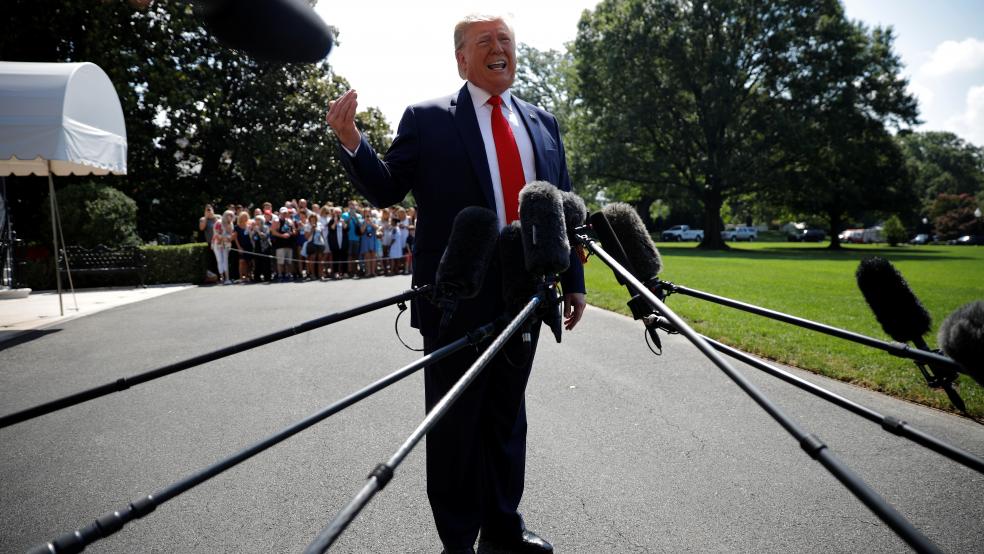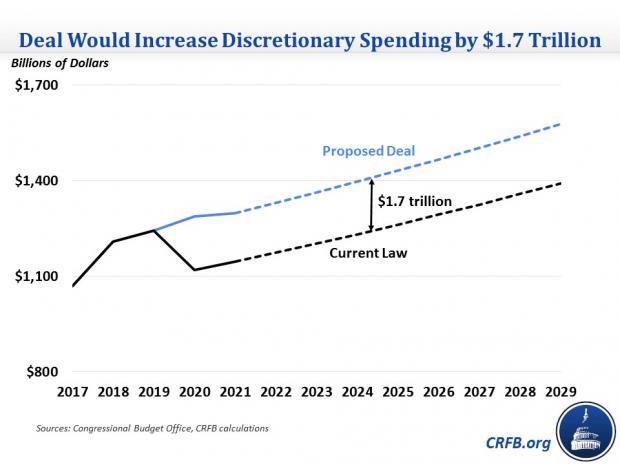They’ve clinched a deal. Now they have to sell it.
The Trump administration and congressional leaders set out Tuesday to ensure they’ll have the votes needed to pass the two-year agreement they reached Monday to raise the debt ceiling and federal spending levels.
Treasury Secretary Steven Mnuchin reportedly met with Senate Republicans on Capitol Hill, assuring them that President Trump supports the deal and will sign it if it passes Congress. And House Speaker Nancy Pelosi sent a letter to colleagues, portraying the bipartisan deal as a win “for Democrats and the American people.”
Yet even as the deal appears likely to be approved, it has raised objections from some rank-and-file members of Congress on both sides — and alarms over its effects on the budget deficit, which was already set to reach $1 trillion as soon as this year. Conservative members of the House Republican Study Committee and Freedom Caucus have spoken out against the deal, citing its fiscal impact.
The agreement would raise spending caps by $320 billion over the next two years relative to the levels set by the 2011 Budget Control Act. It calls for $1.37 trillion in discretionary spending next year and $1.375 trillion in 2021 — and would add about $1.7 trillion to projected debt over the next decade, under the assumption that, without spending caps in place after 2021, outlays would continue to grow at the rate of inflation from that year’s level.
The deal also includes some spending offsets, though the Congressional Budget Office on Tuesday said those offsets of $77 billion in budget authority would only reduce outlays by an estimated $55 billion.
What Lawmakers and Critics Are Saying
Democratic leaders celebrated a win on spending: “Democrats have always insisted on parity in increases between defense and non-defense, and we are pleased that our increase in non-defense budget authority exceeds the defense number by $10 billion over the next two years,” Pelosi and Senate Minority Leader Chuck Schumer said in a joint statement Monday evening. “It also means Democrats secured an increase of more than $100 billion in funding for domestic priorities since President Trump took office.”
Republican leaders touted increases for defense: “The agreement secures the most important priority of the Republican conference,” Senate Majority Leader Mitch McConnell said Tuesday. “In fact, in my view, it’s the most important obligation of the entire Congress: Securing the resources we need to ‘provide for the common defense.’ This deal does it.” McConnell and House Minority Leader Kevin McCarthy both boasted about the relative size of the defense increase. “Given that sequestration cut defense spending more than non-defense, we are pleased that the agreement provides $20 billion more for defense than non-defense over two years,” McCarthy said in a statement.
The White House sees an immigration win: “White House officials have touted an element of the agreement that they said protects Trump’s ability to transfer money among different accounts so that he can partially finance the construction of a wall along the Mexico border,” The Washington Post reported.
And both sides argued that the alternative would have been far worse: While taking jabs at each other, lawmakers across both parties insisted that the debt limit had to be raised since “the full faith and credit of the United States” could not come under question. And they argued that the deal would likely allow them to avoid another government shutdown later this year.
But the deal shows just how little lawmakers care about the deficit: “It’s pretty clear that both houses of Congress and both parties have become big spenders, and Congress is no longer concerned about the extent of the budget deficits or the debt they add,” said David M. McIntosh, the president of the conservative Club for Growth, according to The New York Times. The deficit has increased by an average of 15% for each fiscal year President Trump has been in office, the Times’s Emily Cochrane, Alan Rappeport and Jim Tankersley write.
And it highlights the GOP’s deficit hypocrisy: “This represents a fitting conclusion of the Budget Control Act — the crown jewel of the 2011 ‘tea-party Congress,’” writes Brian Riedl, a senior fellow at the conservative Manhattan Institute think tank. “The decade-long shredding of these hard-fought budget constraints mirrors the shredding of Republican credibility on fiscal responsibility.”
The Washington Post’s James Hohmann reminds readers that McConnell told Trump last month that no politician has ever lost an election for spending more money. “That mind-set – caring more about the next election than the next generation – helps explain why the Senate majority leader and the president endorsed a budget deal last night,” Hohmann writes. “It also illustrates how hollow so much of the rhetoric from McConnell, Trump and other Republicans was during Barack Obama's presidency.”
As for the president? “There is little, if any, evidence,” Hohmann says, “that Trump himself personally cares that the federal balance sheet is drowning in red ink.” Politico’s John Bresnahan and Burgess Everett suggest some new nicknames for the president who loves to bestow them on others: Maybe “Trillion Dollar Trump?” or “Deficit Don?”
But hey, Larry Kudlow is still not worried: Kudlow, the director of the White House National Economic Council, told Fox News that the deficit will shrink as the economy grows. “We never get the spending restraints that we’d like to get,” he said, before adding that the overall budget numbers are “really manageable” and interest rates on 10-year Treasury bonds are remarkably low. “As the economy works its way back, as we get to rebuild the economy, as we get to get growth in this prosperity cycle, I think you’ll see a shrinkage in the budget gap,” Kudlow said.






